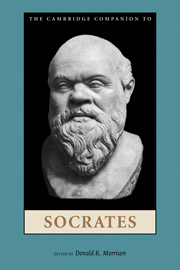Book contents
- Frontmatter
- 1 The Rise and Fall of the Socratic Problem
- 2 The Students of Socrates
- 3 Xenophon and the Enviable Life of Socrates
- 4 Socrates in Aristophanes’ Clouds
- 5 Socrates and the New Learning
- 6 Socratic Religion
- 7 Socrates and Democratic Athens
- 8 Socratic Method
- 9 Self-Examination
- 10 Socratic Ignorance
- 11 Reconsidering Socratic Irony
- 12 Socratic Ethics and the Socratic Psychology of Action
- 13 Socrates and Eudaimonia
- 14 Socrates’ Political Philosophy
- 15 Socrates in Later Greek Philosophy
- Socrates Bibliography
- Index of Names and Subjects
- Index of Passages
7 - Socrates and Democratic Athens
Published online by Cambridge University Press: 28 March 2011
- Frontmatter
- 1 The Rise and Fall of the Socratic Problem
- 2 The Students of Socrates
- 3 Xenophon and the Enviable Life of Socrates
- 4 Socrates in Aristophanes’ Clouds
- 5 Socrates and the New Learning
- 6 Socratic Religion
- 7 Socrates and Democratic Athens
- 8 Socratic Method
- 9 Self-Examination
- 10 Socratic Ignorance
- 11 Reconsidering Socratic Irony
- 12 Socratic Ethics and the Socratic Psychology of Action
- 13 Socrates and Eudaimonia
- 14 Socrates’ Political Philosophy
- 15 Socrates in Later Greek Philosophy
- Socrates Bibliography
- Index of Names and Subjects
- Index of Passages
Summary
In 399 bce, the Athenian citizen Socrates, son of Sophroniscus of the deme (township) Alopece, was tried by an Athenian court on the charge of impiety (asebeia). He was found guilty by a narrow majority of the empanelled judges and executed in the public prison a few days later. The trial and execution constitute the best-documented events in Socrates’ life and a defining moment in the relationship between Greek philosophy and Athenian democracy. Ever since, philosophers and historians have sought to explain troubling aspects of the case: Why was Socrates, the philosophical model of a good man, charged with public wrongdoing? Why was he convicted and why on such a close vote? Was he guilty of impiety or other crimes? Why did he undergo trial and execution, rather than leaving Athens to pursue his philosophical investigations elsewhere? Were his loyalties owed to Athens, to himself, or to the world? And, perhaps most pressing: how did a democratic community, committed to the value of free speech and public debate, come to convict and execute its most famous philosopher-citizen? Because there are no simple answers to these questions the ancient tradition and modern scholarship on the trial and its aftermath are rich and of enduring interest.
- Type
- Chapter
- Information
- The Cambridge Companion to Socrates , pp. 138 - 178Publisher: Cambridge University PressPrint publication year: 2010
- 9
- Cited by

